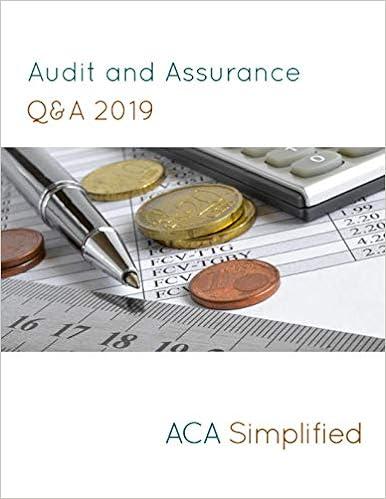Question
5. Book value per common share equals a. total common shareholders equity divided by the number of shares outstanding on the date of the balance
5. Book value per common share equals
| a. | total common shareholders equity divided by the number of shares outstanding on the date of the balance sheet. |
| b. | total common shareholders equity divided by the weighted-average number of shares outstanding during the accounting period. |
| c. | total common shareholders equity divided by the number of shares outstanding on the beginning date of the income statement. |
| d. | total shareholders equity divided by the number of shares outstanding on the date of the balance sheet. |
| e. | total shareholders equity divided by the weighted-average number of shares outstanding during the accounting period. |
6. Earnings per share tells the shareholder the amount of
| a. | cash generated per share of common stock. |
| b. | dividends earned by each common shareholder. |
| c. | dividend per share of common stock. |
| d. | income per share as if preferred stock dividends had been paid. |
| e. | income per share as if common and preferred stock dividends had been paid. |
11. The usual entry to record the conversion of convertible bonds or preferred stock into common shares ignores _____ and shows the swap of common shares for bonds or preferred stock at their _____.
| a. | current market prices; carrying value |
| b. | carrying value; current market prices |
| c. | current market prices; par value |
| d. | carrying value; par value |
| e. | present value of future cash flows; current market prices |
49. A firm issues convertible bonds that pay 8% interest and receives $100,000. The firm could have issued nonconvertible bonds that pay 8% interest but would have received only $80,000 in bond proceeds. What journal entry is necessary under GAAP to record the issuance of the convertible bonds?
| a. | Cash 100,000 Convertible Bonds Payable 80,000 Additional Paid-in Capital 20,000 |
| b. | Cash 100,000 Convertible Bonds Payable 80,000 Convertible Bond income 20,000 |
| c. | Cash 100,000 Convertible Bonds Payable 100,000 |
| d. | Convertible Bonds Payable 100,000 Cash 100,000 |
| e. | No entry is required |
53. Jurisdiction-specific corporate laws limit directors freedom to declare dividends. Which of the following is/are true?
| a. | The board may not declare dividends out of capital, that is, debited against the contributed capital accounts, which result from fund-raising transactions with owners. |
| b. | The board must declare them out of earnings by debiting them against the Retained Earnings account, which results from earnings transactions. |
| c. | Capital may mean the par or stated value of outstanding common shares or the total amount paid in by shareholders. |
| d. | Some jurisdictions allow corporations to declare dividends out of the earnings of the current period even if the Retained Earnings account has a debit (negative) balance because of accumulated losses from previous period. |
| e. | all of the above |
Step by Step Solution
There are 3 Steps involved in it
Step: 1

Get Instant Access to Expert-Tailored Solutions
See step-by-step solutions with expert insights and AI powered tools for academic success
Step: 2

Step: 3

Ace Your Homework with AI
Get the answers you need in no time with our AI-driven, step-by-step assistance
Get Started


